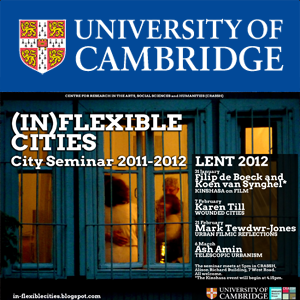City Seminar - 12 February 2013 - Ordinary Topologies: Everyday Life in and out of Ramallah
Duration: 1 hour 25 mins
Share this media item:
Embed this media item:
Embed this media item:
About this item

| Description: |
Dr Christopher Harker (Lecturer in the Department of Geography, Durham University)
Abstract This talk seeks to conceptualise and value some of the quotidian geographies responsible for contemporary forms of urban change. It begins in the contemporary Palestinian city of Ramallah, where many apartment buildings have recently been built, and with emerging work on verticality that would seem well suited to account for such urban change. Work on verticality focuses empirically on prominent cities and spaces of violent conflict, invokes the vertical as politically suspect and offers a theorisation of space that is topographical in nature. Consequently, such accounts produced narratives that obscure topological spatial relations. By contrast, this talk seeks to make space for such topologies, which it is argued are crucial to producing urban and political life itself in many contexts. The concept of ordinary topologies is proposed as a means of attending to the complex and undervalued practices that are thought to be normal (but not static) and common within and across intensive or qualitative spatial-temporal relations. This approach is fleshed out through empirical discussion of changing topographic-topological landscapes in Ramallah. In particular, it is argued that the increasingly verticalized landscape of the city, embodied in rapidly proliferating apartment buildings, must be understood in relation to frequent journeys around the West Bank and changing family relations. |
|---|
| Created: | 2013-02-25 10:18 |
|---|---|
| Collection: | City Seminar |
| Publisher: | University of Cambridge |
| Copyright: | Glenn Jobson |
| Language: | eng (English) |
| Distribution: |
World
|
| Keywords: | CRASSH; City Seminar; Chistopher Harker; |
| Categories: |
iTunes - Society |
| Explicit content: | No |
| Abstract: | Dr Christopher Harker (Lecturer in the Department of Geography, Durham University)
Abstract This talk seeks to conceptualise and value some of the quotidian geographies responsible for contemporary forms of urban change. It begins in the contemporary Palestinian city of Ramallah, where many apartment buildings have recently been built, and with emerging work on verticality that would seem well suited to account for such urban change. Work on verticality focuses empirically on prominent cities and spaces of violent conflict, invokes the vertical as politically suspect and offers a theorisation of space that is topographical in nature. Consequently, such accounts produced narratives that obscure topological spatial relations. By contrast, this talk seeks to make space for such topologies, which it is argued are crucial to producing urban and political life itself in many contexts. The concept of ordinary topologies is proposed as a means of attending to the complex and undervalued practices that are thought to be normal (but not static) and common within and across intensive or qualitative spatial-temporal relations. This approach is fleshed out through empirical discussion of changing topographic-topological landscapes in Ramallah. In particular, it is argued that the increasingly verticalized landscape of the city, embodied in rapidly proliferating apartment buildings, must be understood in relation to frequent journeys around the West Bank and changing family relations. |
|---|---|

